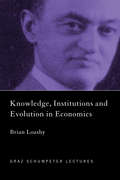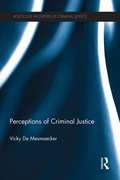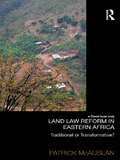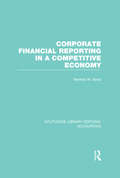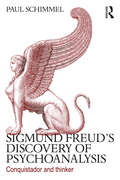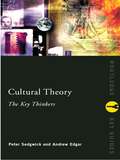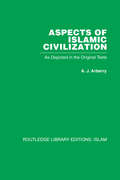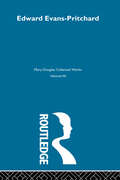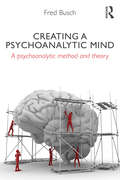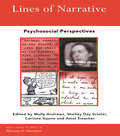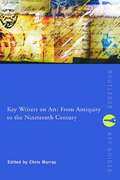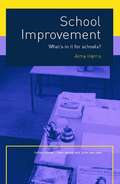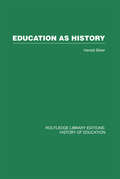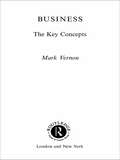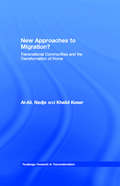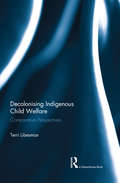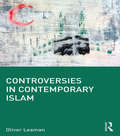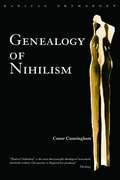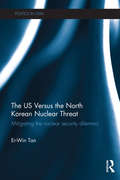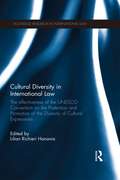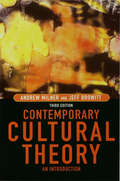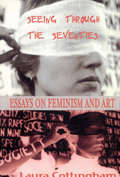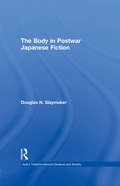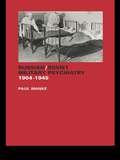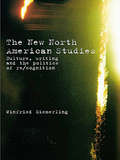Special Collections
Benetech’s Global Certified Accessible Titles
Description: Benetech’s GCA program is the first independent third-party EPUB certification to verify ebook accessibility. By creating content that is born accessible, publishers can meet the needs of all readers. Learn more: https://bornaccessible.benetech.org/
- Table View
- List View
Knowledge, Institutions and Evolution in Economics
by Brian LoasbyWinner of the Schumpeter Prize, 2000 and Winner of the Smith Prize in Austrian Economics, 2000, this book explores how the limitations of human knowledge create both opportunities and problems in the modern economy. The growing field of evolutionary economics has developed as a result of the traditional failure of the discipline to explain certain phenomena that impact greatly on the economy. These are:*Evolution - the impact on the economy of natural change over time*Institutions - the impact on the economy of government and/or company policy, rules and regulations*Knowledge - the impact on the economy that is felt when new information becomes availableKnowledge, Institutions and Evolution in Economics is a punchy overview of these topics and one that has become regarded as something of a modern classic that no serious social sciences academic or student should be without.
Perceptions of Criminal Justice
by Vicky De MesmaeckerIn recent decades, research into the legitimacy of criminal justice has convincingly demonstrated the importance of procedural justice to citizens’ sense of trust and confidence in legal authorities and their resulting willingness to conform to the law and cooperate with the legal authorities. Reversing the age-old question ‘why do people break the law?’, theories of procedural justice have provided insight into the factors that encourage people to abide by the law, suggesting that experiences of procedural fairness are crucial to achieving compliance with the law and to enhancing the legitimacy of criminal justice. While these studies are important in showing that legal authorities need to pay attention to the fairness judgements of the people involved in legal procedures, the focus on showing the importance of procedural justice has had the ironic consequence of distracting researchers from studying the equally important question of what fairness means to the people involved in legal proceedings. In one of the first studies on procedural justice to use a qualitative research design, the author provides the reader with detailed and insightful descriptions of the elements that determine how victims and defendants assess the fairness of their contact with the police and the courts. Focusing on both the pre-trial and the post-trial phases, this book will be of interest to academics and students engaged in the study of the psychology of law, procedural justice and the legitimacy of criminal justice.
Land Law Reform in Eastern Africa
by Patrick McAuslanLand Law Reform in East Africa reviews development and changes in the statutory land laws of 7 countries in Eastern Africa over the period 1961 – 2011. The book is divided into two parts. Part 1 sets up the conceptual framework for consideration of the reforms, and pursues a contrast between transformational and traditional developments; where the former aim at change designed to ensure social justice in land laws, and the latter aim to continue the overall thrust of colonial approaches to land laws and land administration. Part 2 provides an in-depth and critical survey of the land law reforms introduced into each country during the era of land law reform which commenced around 1990. The overall effect of the reforms has, Patrick McAuslan argues, been traditional: it was colonial policy to move towards land markets, individualisation of land tenure and the demise of customary tenure, all of which characterise the post 1990 reforms. The culmination of over 50 years of working in this area, Land Law Reform in East Africa will be invaluable reading for scholars of land law, and of law and development more generally.
Corporate Financial Reporting in a Competitive Economy
by Herman W. BevisThis book is concerned with the financial accounting and reporting of publicly owned corporations to their shareholders. It examines the origins of financial accounting and reporting, external influences on accounting and reporting practices as well as the measurement process.
Sigmund Freud's Discovery of Psychoanalysis
by Paul SchimmelSigmund Freud’s discovery of psychoanalysis explores links between Freud’s development of his thinking and theory and his personal emotional journey. It follows his early career as a medical student, researcher and neurologist, and then as a psychotherapist, to focus on the critical period 1895-1900. During these years Freud submitted himself to the process that has become known as his ‘self-analysis’, and developed the core of his psychoanalytic theory. Drawing on Freud’s letters to his friend and confidant Wilhelm Fliess, and on selected psychoanalytic writings in particular his ‘dream of Irma’s injection’, Paul Schimmel formulates psychoanalytic dimensions to the biographical ‘facts’ of Freud’s life. In 1900 Freud wrote that he was ‘not a thinker’ but ‘a conquistador’. In reality he was both, and was engaged in a lifelong emotional struggle to bring these contradictory sides of his personality into relationship. His psychoanalytic discoveries are conceptualized in the context of his need to achieve integration within his psyche, and in particular to forge a more creative collaboration between ‘conquistador’ and ‘thinker’. Sigmund Freud’s discovery of psychoanalysis will be of interest to psychoanalysts, psychoanalytic psychotherapists, academics and teachers of psychoanalysis, and to all serious students of the mind.
Cultural Theory: The Key Thinkers
by Peter Sedgwick and Andrew EdgarFeaturing over eighty essays, Cultural Theory: The Key Thinkers is a seminal guide to the literary critics, sociologists, historians, artists, philosophers and writers who have shaped culture and society, and the way in which we view them. Ranging from Arnold to Le Corbusier, from Eco to Marx, the entries offer a lucid analysis of the work of influential figures in the study of cultural theory, making this the perfect introduction for the student and general reader alike.
Aspects of Islamic Civilization
by A J ArberryOriginally published in 1964, this volume gathers together extracts from many of Arberry’s best-known works and supplements them with a selection of previously unpublished translations. The material therefore presents a vivid picture of the richness and variety of Islamic civilization from its origins to the late twentieth century.
Evans-Pritchard
by Mary DouglasFirst published in 1980, this book provides an overview of E. E. Evans-Pritchard's approach to anthropology. His seminal works on the Azande and the Nuer had an immense impact on the field in Britain. He wrote these works in his thirties and forties, after which time he became chair of anthropology at Oxford. His pupils and colleagues from his days as the head of Institute of Social Anthropology went from Oxford to complete the institutional establishment of social anthropology. In this book Douglas links the development of her own theories to her training under Evans-Pritchard at the institute and to the close friendship that they forged in the years after.
Creating a Psychoanalytic Mind
by Fred BuschBringing a fresh contemporary Freudian view to a number of current issues in psychoanalysis, this book is about a psychoanalytic method that has been evolved by Fred Busch over the past 40 years called Creating a Psychoanalytic Mind. It is based on the essential curative process basic to most psychoanalytic theories - the need for a shift in the patient's relationship with their own mind. Busch shows that with the development of a psychoanalytic mind the patient can acquire the capacity to shift the inevitability of action to the possibility of reflection. Creating a Psychoanalytic Mind is derived from an increasing clarification of how the mind works that has led to certain paradigm changes in the psychoanalytic method. While the methods of understanding the human condition have evolved since Freud, the means of bringing this understanding to patients in a way that is meaningful have not always followed. Throughout, Fred Busch illustrates that while the analyst's expertise is crucial to the process, the analyst's stance, rather than mainly being an expert in the content of the patient's mind, is primarily one of helping the patient to find his own mind. Creating a Psychoanalytic Mind will appeal to psychoanalysts and psychotherapists interested in learning a theory and technique where psychoanalytic meaning and meaningfulness are integrated. It will enable professionals to work differently and more successfully with their patients.
Lines of Narrative
by Molly Andrews and Corinne Squire and Amal Treacher and Shelley Day SclaterThis volume brilliantly advances our understanding of the use of narrative in the social sciences. It brings together contemporary work on narrative theory and methods and presents a fascinating range of case-studies, from Princess Diana's Panorama interview to the memoirs of the wives of US nuclear scientists.
Key Writers on Art: From Antiquity to the Nineteenth Century
by Chris MurrayKey Writers on Art: From Antiquity to the Nineteenth Century offers a unique and authoritative guide to theories of art from Ancient Greece to the end of the Victorian era, written by an international panel of expert contributors. Arranged chronologically to provide an historical framework, the 43 entries analyze the ideas of key philosophers, historians, art historians, art critics, artists and social scientists, including Plato, Aquinas, Alberti, Michelangelo, de Piles, Burke, Schiller, Winckelmann, Kant, Hegel, Burckhardt, Marx, Tolstoy, Taine, Baudelaire, Nietzsche, Ruskin, Pater, Wölfflin and Riegl.Each entry includes:* a critical essay* a short biography* a bibliography listing both primary and secondary textsUnique in its range and accessibly written, this book, together with its companion volume Key Writers on Art: The Twentieth Century, provides an invaluable guide for students as well as general readers with an interest in art history, aesthetics and visual culture.
School Improvement
by Alma HarrisThis book aims to demystify the principles and practice of school improvement by demonstrating how successful classroom and school improvement occurs. It outlines the conditions, strategies and approaches that promote sustainable improvement and provides an overview of the main theoretical perspectives in this area. This accessible text will be useful for practitioners working within schools and with schools, offering clear guidance for those keen to raise standards and improve achievement. The What's In It For Schools? series aims to make educational policy issues relevant to practitioners. Each book in the series focuses on a major educational issue. The author sets the issue in context, looks at how it impacts on the daily lives of schools and teachers, and raises key questions. The books are grounded in sound theory, recent research evidence and best practice, and will make an excellent addition to any staffroom bookshelf.
Education as History
by Harold SilverOriginally published 1983.This book explores the nature of the social history of education. It examines what aspects of the history of education have been neglected and why. The themes explored include the relationship between education and the emergence of social science, the reputations of educationists, expectations of higher education in the twentieth century, the use of education against poverty and education as policy and case study.
Business: The Key Concepts
by Mark VernonHere is a practical guide to the essentials of business. This book provides everything you need to know about the key concepts and terms, from accountability to zero-sum game. Everything from management, economics and finance to marketing, organizational behaviour and operations is covered in just the right amount of detail to make things clear and intelligible. Business: The Key Concepts: * is detailed yet approachable* considers new developments in business, notably eBusiness and contemporary business ethics* covers established subjects, taking an international and strategic perspective that balances theory and practice* suggests specific further reading for many concepts and also includes an extensive bibliography. Whether you're already in business and could do with a handy reference guide, or you're a student needing an introduction to the fundamentals, Business: The Key Concepts is the perfect companion.
New Approaches to Migration?
by Khalid Koser and Nadje Al-AliThis book critically evaluates the transnational communities approach to contemporary international migration. It does so through a specific focus on the relationship between 'transnational communities' and 'home'. The meaning of 'home' for international migrants is changing and evolving, as new globally-oriented identities are developed. These issues are explored through a number of central themes: the meaning of 'home' to transnational peoples, the implications of transforming these social spaces and how these have been transformed.
Decolonising Indigenous Child Welfare
by Terri LibesmanDuring the past decade, a remarkable transference of responsibility to Indigenous children’s organisation has taken place in many parts of Australia, Canada, the USA and New Zealand. It has been influenced by Indigenous peoples’ human rights advocacy at national and international levels, by claims to self-determination and by the globalisation of Indigenous children’s organisations. Thus far, this reform has taken place with little attention from academic and non-Indigenous communities; now, Decolonising Indigenous Child Welfare: Comparative Perspectives considers these developments and, evaluating law reform with respect to Indigenous child welfare, asks whether the pluralisation of responses to their welfare and well-being, within a cross-cultural post-colonial context, can improve the lives of Indigenous children. The legislative frameworks for the delivery of child welfare services to Indigenous children are assessed in terms of the degree of self-determination which they afford Indigenous communities. The book draws upon interdisciplinary research and the author’s experience collaborating with the peak Australian Indigenous children’s organisation for over a decade to provide a thorough examination of this international issue. Dr Terri Libesman is a Senior Lecturer in the Law Faculty, at the University of Technology Sydney. She has collaborated, researched and published for over a decade with the peak Australian Indigenous children’s organisation.
Controversies in Contemporary Islam
by Oliver LeamanThis book helps to deepen our understanding of the varieties of contemporary Islam and the issues that are of most concern to Muslims today. Oliver Leaman explores some of the controversies and debates that exist within Islam and between Islam and other religions. He considers how the religion can be defined by looking at the contrast between competing sets of beliefs, and arguments amongst Muslims themselves over the nature of the faith. Areas covered include: Qur’anic interpretation, gender, finance, education, and nationalism. Examples are taken from a range of contexts and illustrate the diversity of approaches to Islam that exists today.
Genealogy of Nihilism
by Conor CunninghamThis text re-reads Western history in the light of nihilistic logic, which pervades two millennia of Western thought. From Parmenides to Alain Badiou, via Plotinus, Avicenna, Duns Scotus, Ockham, Descartes, Spinoza, Kant, Hegel, Heidegger, Sartre, Lacan, Deleuze and Derrida, a genealogy of nothingness can be witnessed in development, with devastating consequences for the way we live.
The US Versus the North Korean Nuclear Threat
by Er-Win TanAlthough the current world order is still dominated by the US, there is increasing international concern over the possibility of regional security dilemmas arising from smaller powers’ attempts to develop Weapons of Mass Destruction. A study of US-North Korean interaction using the security dilemma as a conceptual frame of analysis is thus not only hugely topical, but also particularly relevant for the 21st century on theoretical as well as empirical grounds. Is there the prospect of a security dilemma contagion if North Korea acquire nuclear weapons capability leading to an Asia Pacific wide nuclear arms race? This book examines this contentious issue in-depth and explores the difficult choices policymakers face as a result of the uncertainty in international politics.
Cultural Diversity in International Law
by Lilian Richieri HananiaThe UNESCO Convention on the Protection and Promotion of the Diversity of Cultural Expressions (CDCE) was adopted in 2005 and designed to allow States to protect and promote cultural policies. This book examines the effectiveness of the CDCE and offers ways by which its implementation may be improved to better attain its objectives. The book provides insight in how the normative character of the CDCE may be strengthened through implementation and increasingly recurrent practice based on its provisions. Hailing from various fields of international law, political and social sciences, the book’s contributors work to promote discussions on the practical and legal influence of the CDCE, and to identify opportunities and recommendations for a more effective application. Part One of the book assesses the effectiveness of the CDCE in influencing other areas of international law and the work conducted by other intergovernmental organizations through the recognition of the double nature (cultural and economic) of cultural goods and services. Part Two focuses on the practice of the CDCE beyond the recognition of the specificity of cultural goods and services in international law by addressing the CDCE’s call for greater international cooperation and stronger integration of cultural concerns in development strategies at the national and regional levels. The book will be of great use and interest to academics and practitioners in law, social and political sciences, agents of governmental and international organizations, and cultural sector stakeholders.
Contemporary Cultural Theory
by Andrew Milner and Jeff BrowittFirst Published in 2002. Routledge is an imprint of Taylor & Francis, an informa company.
Seeing Through the Seventies
by Laura CottinghamIn recent years, Laura Cottingham has emerged as one of the most visible feminist critics of the so-called post-feminist generation. Following a social-political approach to art history and criticism that accepts visual culture as part of a larger social reality, Cottingham's writings investigate central tensions currently operative in the production, distribution and evaluation of art, especially those related to cultural production by and about women.Seeing Through the Seventies: Essays on Feminism and Art gathers together Cottingham's key essays from the 1990's. These include an appraisal of Lucy R. Lippard, the most influential feminist art critic of the1970's; a critique of the masculinist bias implicit to modernism and explicitly recuperated by commercially successful artists during the 1980s; an exhaustive analysis of the curatorial failures operative in the "Bad Girls" museum exhibitions of the early 1990s; surveys of feminist-influenced art practices during the women's liberationist period; speculations on the current possibilities and obstacles that attend efforts to recover lesbian cultural history; and an examination of the life, work and obscuration of the early twentieth-century French photographer Claude Cahun.
The Body in Postwar Japanese Fiction
by Douglas SlaymakerThis book explores one of the crucial themes in postwar Japanese fiction. Through an examination of the work of a number of prominent twentieth century Japanese writers, the book analyses the meaning of the body in postwar Japanese discourse, the gender constructions of the imagery of the body and the implications for our understanding of individual and national identity. This book will be of interest to all students of modern Japanese literature.
Russian/Soviet Military Psychiatry 1904-1945
by Paul WankePsychiatry, like most professional fields in Russia, gained its legitimacy from its ability to serve the Tsar and later the Bolshevik party. The militarised nature of these governments meant that psychiatry would have to prove its worth to the military. This study will cover Russian/Soviet military psychiatry from its first practical experience during the Russo-Japanese war to its greatest test during the Great Patriotic War 1941-45. Throughout this study, the continuity between Russian and Soviet military psychiatry will be emphasised. For example, psychiatry's materialist school dominated throughout this period and that Russia's acceptance that psychiatric casualties will occur allowed them to focus their resources on treatment rather than prevention.
The New North American Studies
by Winfried SiemerlingWinner of the English Book Award, Grand Prix du Livre 2006 de la Ville de Sherbrooke. In this original and groundbreaking study, Winfried Siemerling examines the complexities of recognition and identity, rejecting previous nationalized thinking to approach North American cultural transformations from transnational and interdisciplinary perspectives. Using material from the United States and Canada as case studies and drawing on a wide range of texts and theorists, he examines postcoloniality and cultural emergence from the sixties to the present against earlier backgrounds. Siemerling's argument for a retheorization of the field takes on the full history of multiculturalism debates, including radical readings of W.E.B. Du Bois and Charles Taylor and their relation to G.W.F. Hegel, and challenging many of the models of multiculturalism in use today. Tackling controversial subjects such as identity politics, The New North American Studies proposes a fresh outlook on the most central issues of North American cultural politics, from debates on canon formation to the role of racial and linguistic difference. Concluding with a look at the future of cultural difference, Winfried Siemerling's study is an innovative rethinking of the whole field of North American Studies.
